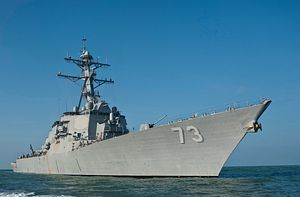On Sunday, the United States Navy carried out a freedom of navigation operation (FONOP) in the Spratly Islands. USS Decatur, an Arleigh Burke-class guided missile destroyer, sailed within 12 nautical miles of Chinese artificial islands at Gaven and Johnson Reefs as part of a ten-hour patrol. The reefs are claimed by China, the Philippines, Vietnam, and Taiwan.
Sunday’s operation appears to have been an innocent passage designed to protest Chinese prior notification requirements around Gaven and Johnson Reefs. In 2016, a Hague-based arbitral tribunal decided that under the United Nations Convention on the Law of the Sea, which the U.S. Navy treats as customary international law, Johnson and Gaven Reefs are both classified as “rocks.” Article 121 of UNCLOS notes that these types of features “shall have no exclusive economic zone or continental shelf.”
The operation is the first publicized freedom of navigation operation by the Trump administration in months. Beginning last year, not all U.S. Navy freedom of navigation operations were publicized. The last major publicized operation took place in May 2018, when a U.S. Navy Arleigh Burke-class destroyer, USS Higgins, and a cruiser, USS Antietam, sailed within 12 nautical miles of islands controlled by China in the disputed Paracel Islands.
The Decatur‘s latest operation comes just days after the U.S. Air Force flew two nuclear-capable B-52H Stratofortress bombers from Guam’s Anderson Air Force Base in the Western Pacific over the East and South China Seas last week. The bombers arrived at the U.S. military’s base on Diego Garcia in the central Indian Ocean. They were accompanied by Japan Air Self-Defense Force fighters in the Western Pacific.
The latest U.S. FONOP coincides with a time of general bilateral tensions in the U.S.-China relationship. Recently, China canceled two separate rounds of talks with Washington; trade talks were called off after the Trump administration moved ahead with a $200 billion tranche of new tariffs on Chinese products and military talks were called off following the enactment of sanctions against the People’s Liberation Army’s Equipment Development Department after China took delivery of Russian weapon systems. Moreover, in September, the U.S. State Department approved a possible sale of $330 million military aviation replacement parts for Taiwan.
U.S. FONOPs are designed to assert rights granted to all seafaring states under international law, and not as a particular means of pressuring China. FONOPs in the South China Sea have, in the past, contested claims by other claimants too. However, China sees these U.S. operations as an example of the United States’ pursuing the militarization of the region. Washington, in turn, has accused China of gradually militarizing its artificial islands in the Spratlys, which it had claimed were built for peaceful purposes.
In May, in retaliation for China’s decision to place missiles on the disputed Spratly Islands and land an H-6K bomber on Woody Island, the United States also decided to withdraw its invitation for the People’s Liberation Army-Navy to take part in this summer’s biennial Rim of the Pacific (RIMPAC) multilateral naval exercises.

































